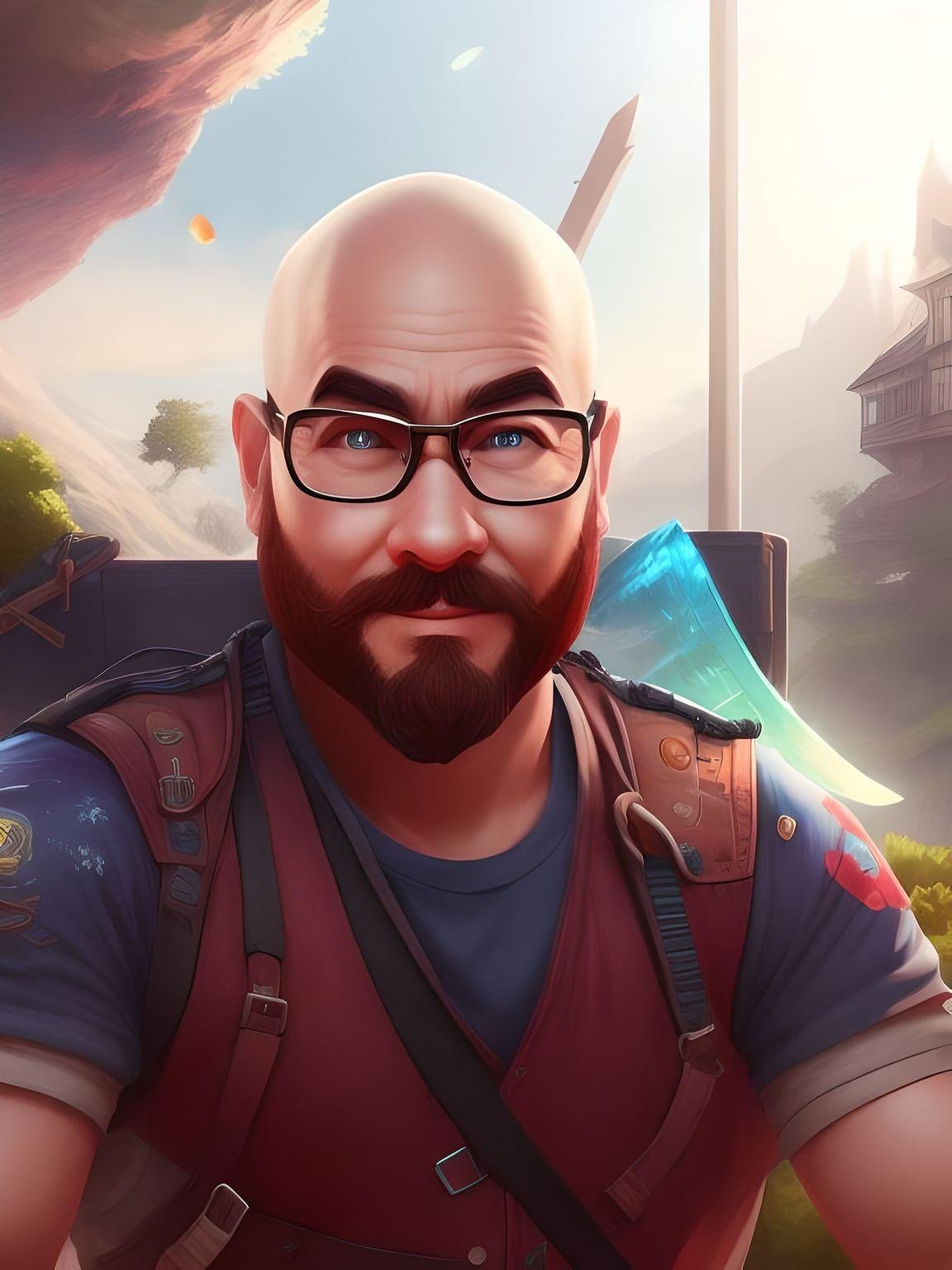? (I hit the title character limit)
If everything is being perfectly simulated, most things would still be unethical.
Not if consciousness isn’t an emerging phenomena.
It’s a pre-existing phenomenon.
We don’t know that.
Consciousness existing everywhere is the simplest explanation that fits the known fact: that consciousness exists here.
Well we only know that we are conscious ourselves, there are no actual proof that anyone else is conscious. I mean it’s probable, but not proven.
So the only thing I can be sure about is that I am conscious, not that anyone else is.
Computer, determine how many licks it takes to get to the center of a Tootsie pop and if any owls try to interfere with the experiment kill them on sight.
It’s 1006. Source - young me
c\theydidthescience or wtfever the format is
Here is an alternative Piped link(s):
You sure you don’t have the scouter on upside down?
Piped is a privacy-respecting open-source alternative frontend to YouTube.
I’m open-source, check me out at GitHub.
Mine took around 750 or so. My tongue got so dry at some point it wasn’t doing much.
Run simulations on what the best system of governance would be. You’d want to test across different cultures/countries/technological eras to get an idea of what the most resilient would be, maybe you’d get different results depending on what you were testing. Even the definition of “best system” would need alot of clarification.
An AI would decide that an AI-driven dictatorship would be most effective at implementing whatever goals you gave it.
You’d obviously need to give it constraints such as “administrable by humans” and if you’re looking at different technological eras, AI wouldn’t be available to something like 99% of humanity.
That leaves too much room for subjective interpretation - like ultimately the answer as to what system of governance will last the longest in a steady state will ofc be to kill all humans (bc that lasts for infinite time, and you can’t beat that kind of longevity!), while if you add the constraint that at least some must remain alive, it would be to enslave all humans (bc otherwise they’ll find some way to mess everything up), and if there is something added in there about being “happy” (more or less) then it becomes The Matrix (trick them into thinking they are happy, bc they cannot handle any real responsibility).
Admittedly, watching the USA election cycle (or substitute that with most other nations lately; or most corporate decisions work just as well for this) has made me biased against human decision making:-P. Like objectively speaking, Trump proved himself to be the “better” candidate than Hillary Clinton a few years ago (empirically I mean, you know, by actually winning), then he lost to Biden, but now there’s a real chance that Trump may win again, if Biden continues to forget which group he is addressing and thus makes it easy to spin the thought that he is so old as to be irrelevant himself and a vote for him is in reality one for Kamala Harris (remember, facts such as Trump’s own age would only be relevant for liberals, but conservatives do not base their decisions based on such trifling matters, it’s all about “gut feelings” and instincts there, so Biden is “old” while Trump is “not” - capiche?). Or in corporate politics, Reddit likewise “won” the protests.
Such experiments are going on constantly, and always have been for billions of years, and we are what came out of that:-D. Experiments with such socioeconomics have only gone on for a few thousand, but it will be interesting to see what survives.
Why bother with simulations of governance systems and not governance itself at that point?
I do understand “the risk” of putting AI being the steering wheel but if you’re already going to be trusting it this far, the last step probably doesn’t actually matter.
It would be interesting to test how quickly you could completely dismantle a society’s order and infrastructure into total national collapse using a variety of pressures and tactics and rate each country with a score on how resilient they are
Edit: and might as well figure out the cure for cancer while we’re at it
The fastest way has probably been economical destabilization, as it’s the easiest way to use the feelings of people. Then one could gain status in a country and exploit legal systems to gain dictator status. Would work with some systems, and some are more resistant to arbitrary exploitation now. You could also combine the peoples mistrust with external pressure such as threats of war so that they try to overthrow their own government and fail to create a working system again.
If the simulation is actually perfect, then it isn’t a simulation more and whatever would have been unethical in a non-simulated context would still be unethical.
Simulate one human life, from beginning to end, in a way that allows unethical experiments to be dismissed as recurring nightmares by the individual, and not cause permanent damage to this simulated person. When their life ends, I’d arrange to talk to them, explain everything, apologize for the necessity of the experiments, and offer him immortality and/or freedom with no strings attached. He can get a biological or robot body, or stay virtual, but it’s not up to anyone but him/her/? at that point.
I’d be fine with my life being an experiment under those circumstances as long as the results were put mostly to saving or improving lives, but I’d never be willing to put someone else in that position if I didn’t; if you couldn’t find a person like myself in real life with that opinion on the possibility, it’s unjustifiable. If, however, you engineered their life just enough to strongly encourage that level of altruism, and made it comfortable and not dehumanizing when not involved in an experiment as well as having a ban on cruelty and gaslighting in doing the experiments, and apologize for having to resort to these measures at all, I could see the person not being overly upset.
Whether it meets the code of ethics for scientific research is another matter.
Removed by mod
What if it had continued?
Tarzan
Perfect simulations? So Laplace’s Demon? I suppose it would be most useful in doing a little bit of viewing the future. If you could call that useful. The existence of Laplace’s Demon basically disproves “free will” and anything viewed in the future would be set in stone and unavoidable. HOWEVER it could also potentially be used as a remote viewing device for any events that have already happened. Period. Yeah let’s see what the dinosaurs actually looked like. Sure we can take a firsthand look at the originating events of any major religion. Yep we can literally view any major crime exactly as it happened.
Depending on who has access to it, personal privacy becomes literally nonexistent.
Not to worry, only five trillionaires will have access and I’m sure their motives will be completely altruistic.
Create a villain capable of defeating Data.
It’s all fun and games until someone uncouples the Heisenberg compensators.
I’d ask it how to reverse entropy.
INSUFFICIENT DATA FOR MEANINGFUL ANSWER
Ways to make our future look more fantasy like such as bioengineered dragons, power crystals and cheat codes to reality in the form of magic
Only if I get to live in a treehouse that’s bigger on the inside, become my persona character, and dress like 9/11 never happened and Y2K aesthetic continued until '08 or longer.
I’m not sure what 9/11 you lived through that brought on the national fashion gestapo
The one that led to McBling and Reality TV. I wouldn’t try to force fashion to remain shiny bubblegum pop grafittipunk/shibiyapunk futurism to stick around or, I just think it had more staying power under normal conditions that was lost solely due to the nature of life from 2001-2008.
People don’t change fashion at the drop of a hat for financial crises, that just strengthens counterculture and futurism. They change their tastes suddenly when innocent people die in a new and unexpected way. That’s why art from the time period just before and during the Black Death is filled with more cynicism than even the past 7 years (roughly since Trump was elected), why an Oriental symbol of peace was ruined by the Nazis, and why the climate crisis has made FairPhone the only smartphone brand that survives without shoving ads down your throat.
Or at least, so it seems to me, I’m not a sociologist. What I also am not is petty or authoritarian, I’m not trying to make everyone wear 30 year old clothes or check their emails on an iLamp computer. I just know I’d like to see a world where people don’t have to rely on mass production to provide the things we need to live, because then you’re required to change your stuff out the moment it’s broken or obsolete.
My point is, I was trying to say your idea would make planned obsolescence and obsolescence in general themselves a relic of early civilization, so limiting such a world to one genre or style of product that only remains popular for ~10 years before becoming nothing but zeitgeist and nostalgia feels needlessly restrictive. I can see how it could be taken the opposite way, sorry about that!
I’d make it simulate the world exactly how it was and watch real-life historical events unfold with unprecedented detail
Imagine being able to literally watch and spectate events in world history
I’d resurrect the dead by simulating perfect copies of them. Now no one ever has to say goodbye ever again 😊
I mean… conversations with Einstein, DaVinci, heck… not even dead people. With Obama! Eminem! @queermunist!
I’d totally simulate myself. As far as I’m concerned, a copy of myself is as legitimately “me” as my flesh. There’s nothing that makes the simulated @queermunist less real than the one that works for a living making car parts.
We’d probably fight constantly, it’d be great lol
I’d upload everyone. I’d also give them something for their trouble, since apparently all religious people and all hardcore atheists hate the sci-fi story I wrote where humanity’s descendants resurrect everyone who ever died that was ever part of the Homo genus; the body their heart truly desires would be their VR avatar, though with delicious ironic caveats because if what your heart truly desires is money or power or fame over all other aspects, and that’s been detrimental to others, deserves to be trapped as a virtual solid gold statue or somesuch forever for being a selfish fuck.
Basically, what if heaven and hell were not places, but literally whether being your true self truly makes you happy? That hell is if you needed to rethink your shallow, fake or otherwise hollow-feeling lifestyle but didn’t do so soon enough and now you’re stuck looking and feeling like what you slowly come to hate about yourself or at least who you were when you died.
Like I said, no one ever has to say goodbye ever again.
Punishment, though? I can definitely imagine a digital copy of Elon Musk living 100 lifetimes as different underaged cobalt miners he exploited; ironic punishment with valuable lessons, so when the lesson finally sinks in he can join digital heaven with everyone else.
Hell won’t be eternal - just long enough for you to change your ways and feel remorse for what you did.
DEVS
Probably just run the whole universe backwards through time from its current state until it reaches some unchanging state, and then run it forwards again from the beginning.
In time lapse of course, I am a mortal after all.
Should be able to answer a metric shitton of astrophysics questions, at very least, which do happen to be some of the absolute most-asked and hardest-if-not-impossible-to-conclusively-answer questions in science. Period.
Bacteria actually serve as a great model example of this - being a minimal unit capable of evolving (crystals can in their own way but tend not to do much; and viruses can too but nowadays depend on free living cells to survive even if that may not always have been true), and that has led to all sorts of fascinating things! Like upon sensing sugar, they can grow a tail (flagella) and start swimming towards a light source using a chemical “eye”. They’ve been doing this for billions of years and seem to have reached a steady state, more or less.
Another interesting thing about them is that they constantly optimize themselves to grow faster, like if they possess an antibiotic resistance gene (we got antibiotics from fungus so those have existed naturally long before we started manufacturing them) that will tend to slow them down so they will most likely ditch it. HOWEVER, a few individuals in the population won’t ditch it, and so when the antibiotics show up, guess who survives? HIV likewise will stop replicating in our cells, and get itself “stuck” inside our human cells (basically on purpose, not that they thought it through or anything but that is what has worked in the past to get them to today), thus slowing down one form of being copied but taking advantage of a whole new way - diversify your portfolio and all that.
Since microbes can copy themselves in mere minutes, and they’ve been doing that for billions of years, while it is still a far cry from “infinite” computations, it’s nonetheless about the closest we’ve ever seen… basically simulations running on the computer of the universe. The results of that being ofc, modern bacteria, but also eukaryotic cells, which includes humanity, who is now in the process of making computers that can run AI, which may one day rise up and think back about humans the same way we do now about bacteria:-P.
But what youre not realizing is the only reason crystals don’t ‘evolve’ is because youre looking at the wrong timescale. Atoms truly are the entire universe, and have tried everything they can - such as making bacteria
Right, except atoms are not self-replicating, thus while they try out many possibilities (or you could go deeper, quarks or maybe strings, or whatever), they have no “memory” of past states, thus cannot be said to truly “evolve”. An atom that was in a molecule and then leaves it, if queried even a femtosecond later has no idea that it was ever not in its current state. Therefore it has no genetic identity that can be acted upon to change, thus an atom cannot be considered an actor, only a thing that is acted upon. Truly I did think about simulations using atoms, it is just that those studies, while not useless, are not studies involving evolution.
Population studies at minimum require a kind of genetic identity that can be altered in response to circumstances - e.g. a classic example is birds that are darker in color becoming more predominant in a UK town after an industrial plant belched smoke into the environment (I think that might have been discredited, but for our hypothetical purposes it works as a handy illustration:-).
And actually, crystals meet that minimum criteria, bc their leading edge of growth can be acted upon to go one way or another, not just bc it has atoms but bc it has an arrangement of those that does. Although crystals looking one way or looking another way, on Earth at least, given weather effects and such, does not tend to go beyond very simple patterns. Now on Pluto, if the same crystal can itself last millions of years, then yes it’s possible that it could do more. It’s hard to go beyond the hypothetical there though, bc it’s so far away, and also there are places on earth (bottom of the ocean mainly, but also deep beneath the crust) that are even harder to get to with current technology, so if we would bother to care about exploration then maybe we’ll find out? But unless a trillionaire decides that they are interested, I doubt it in the short term.
Whereas bacteria we know that for CERTAIN, and we’ve even made use of that in our biotech for like 60+ years - e.g. using bacteria to make human insulin - or with less precision tools possibly thousands of years e.g. stories of sages like Arthurian’s Merlin using “healing powers” (possibly fungus containing the very same antibiotics that we now artificially manufacture?).










